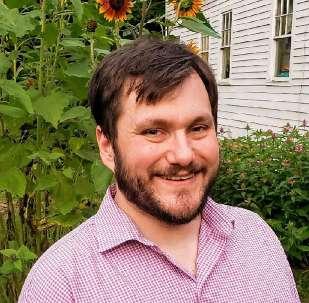
4 minute read
New Year’s Resolutions? Many seek help from experts
Metro Creative Graphics
These fonts of spiritual, physical and psychological wisdom share their thoughts on how to make healthy changes in your life
By JiM Therrien
UpCountry Magazine BENNINGTON — Most people ponder lifestyle changes around New Year’s Day, and those inspired to push beyond daydreaming often seek expert advice and support.
UpCountry sought out and asked three experts, who qualify as motivators of positive change, how they might try to help.
“A lot of people don’t like New Year’s resolutions,” said Kurt White, the senior director of outpatient programs and community initiatives at the Brattleboro Retreat.
That’s because so many firm resolutions fade away in February, White said, often to be forgotten until the next new year rolls around.
“I actually like New Year’s as a way to organize and think about change, and energize others to think about where we are and where we’re going,” he said.

Photo provided
ORGANIZED REFLECTION
That approach is similar to what those in the mental health field employ in general, said White, a clinical social worker.
His work with patients is typically more serious than some year-end resolutions, he said, “but I think everybody can relate to the idea that there are things about ourselves and
White said it’s helpful to first “take a nonjudgmental look at where we are and where we want to go.”
And try to focus on one or two things to change, he said, not four or five, which is when “people set themselves up” for failure. “Work with a friend or partner,” White added. “That can help. Use the power of others to make the change.”
For those interested in a structured evaluation of themselves and their resolution goals, White suggested going to YearCompass. com and using the online format to set down reflections and goals in a written or digital “booklet.”
Thinking about resolutions should be “less about goals and more about getting in touch with your values,” White said.
“It’s always worthwhile to try to change things,” he said, even despite a string of failures.
He said professionals who assist people in smoking cessation programs soon learned that “if people keep trying to quit, they do eventually quit. … It’s like building up the muscle to quit.”
Photo provided

MORE THAN WEIGHT LOSS
Sandy Stevens, owner of Time For Yourself in Bennington, said she takes a broad approach to physical fitness when working with clients.
“When I talk to clients, I talk about the value of your health and not just losing weight,” she said.
Stevens brings a deep resume to her work with clients: She’s trained in myofascial release massage therapy, is a certified personal trainer, has a doctorate in clinical nutrition and a degree in exercise science and sports management.
Stevens said she works with individuals and with “small groups of no more than nine or 10,” and tries to get to know her clients and their goals, capabilities and limitations.
“I think it’s important to meet people where they are,” she said.
In that regard, Stevens organizes classes for specific groups, rather than offering large classes open to all that follow one format and pace.
Often, Stevens said, “the biggest challenge is trying to explain that this is not a quick fix. They need to stay with it continuously, and the longer they do it, the more they crave it.” Stevens said the functional physical training she offers can help people with many personal fitness resolutions. “Now, I am prepping them for ski season, or being on ice and maintaining their balance,” she said.
Similar training helps prepare people — especially the elderly — for picking up or moving heavy objects, such as wood pellets for the stove, or moving boxes, while avoiding debilitating injuries.
Photo provided

USUALLY SERIOUS
The Rev. Kathleen S. Clark, pastor of Federated Church of East Arlington since 2007, said that when people come to her for advice or support, they’re usually at a crisis point in their lives.
“They are usually having a hard time when they come to me,” Clark said. “It could be the end of a marriage or a job change, or a job change where they would be moving: the bigger life changes.”
These also are typically changes that could affect others in the family or the community, she said.
Clark said she doesn’t try to be “a self-help guru,” but believes “my role is to listen. Sometimes they want to talk out an idea.”
Sharing a problem or dilemma and “talking out loud,” rather than just internally, allows someone to better weigh the potential impacts on others, as well as the short- and long-term consequences, Clark said.
She is also someone people can talk to in confidence about some “pretty private” issues, rather than discuss those with a family member or friend possibly affected by the issue.
Her role “can be pretty challenging,” she said, “especially with family dynamics.”
“I’m also a person of faith,” Clark said, and she often tries to help the person determine, “‘Where is God or the sacred in your life right now?’”
And Clark suggests sources of information — such as for financial advice — that the parishioner might require.
“I hope to be a non-anxious presence, and not tell people what to do,” but help them come to a determination, she said.








